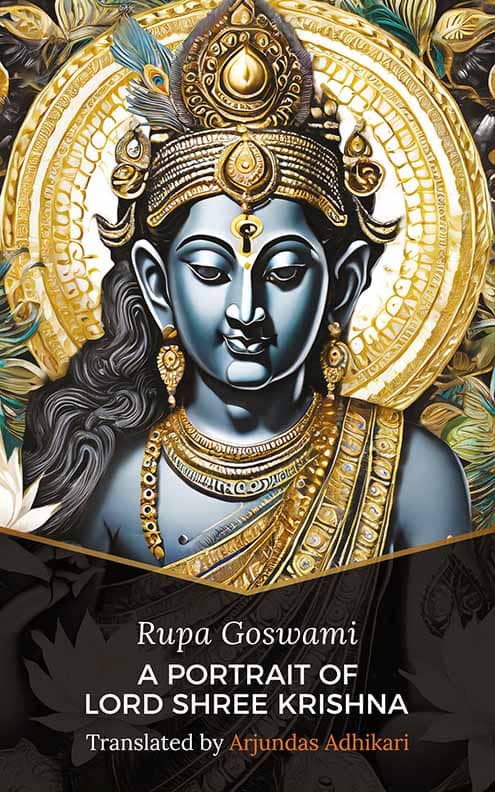
In parts of Asia there are artists working in boiler shops, who, for a mere $50 – $100 will rattle off a reproduction of one of Monet’s famous water-lily paintings in oils, in a matter of minutes. However, the subtlety of expression in the original painting, and the original’s power to emote, is unlikely to be reproduced. The accurate copying of masterpieces of art is a rigorous affair, and used to be considered a central element of artistic training in European art academies.
Regarding the objective of accurately translating a 16th century Sanskrit drama like A Portrait of Lord Shree Krishna, into English, I have, on occasion, attempted to point out what the disobliging consequences of poor translating are. And wherever the refined dramatic composition of the text is thoroughly misrepresented, the emotional and inspirational effect of the original play can be partially, if not, wholly, altered.

Especially in a spiritually-charged, supernaturally-themed drama such as Vidagdha Madhava, a.k.a. A Portrait of Lord Shree Krishna, suspension of disbelief of extraordinary events/characters by the audience necessitates (to quote Samuel Coleridge {above}) “human interest and the semblance of truth.” Coleridge explains how “willing suspension of disbelief for the moment … constitutes poetic faith.” An audience unable to identify any semblance of truth in a drama, will be unable to derive entertainment from what they are watching, unable to experience poetic faith, and unable to feel any spiritual catharsis either.
At the risk of being repetitious, I will present one further example of mistranslation occurring in the second act of one good person’s attempt at translating Rupa Goswami’s other major dramatic, work, Lalita Madhava. I recognise I may appear to be over-stressing the pitfalls of negligently translating Sanskrit, or Hindu drama, but as it is far too commonly done, I feel it should be brought to everyone’s attention: it invariably relegates the quality of the works of playwrights like Rupa Goswami, to literary mediocrity, and that, by Bill Shakespeare, is irregular to say the least!
Towards the end of Act II in Lalita Madhava by Rupa Goswami, Radha, the drama’s heroine, is about to be kidnapped from Her village by the agent of a covetous overlord who has feverishly come to want to make Her his own. The agent of this letch, expresses his intentions here as follows:
I shall seize this star of beauteous young girls, and whisk Her away!
The Sanskrit transliteration for this is:
padmini kam shirasi grihitva neshyam iti
(word for word:) padmini – an excellent woman (who’s like a lotus flower); kam – unique: shirasi – topmost/principal/chief/head; grihitva – seize; neshyam – whisk off; iti – thus.
The incorrect translation goes:
I will grab the hair of this lotus-like girl … and drag Her away!
The error here is the mistranslation of the word shirasi. Shirasi does not mean hair. Shirasi-ja means hair (that which grows from the head) but here we only have the word shirasi, meaning, the head, or, the topmost of something. Shirasi implies superlativeness, as in something that is topmost in its category. In this case, Radha is the topmost in the category of beautiful girls (padmini), and this is whom the agent intends to seize and whisk away, and he declares he is about to do so. He intends to “seize this star of beauteous young girls,” but he does NOT propose to “seize the young girl by the hair”!!
That Rupa Goswami would be as indelicate as to present Radha being treated in such a distasteful manner is anathema. For starters, in the Hindu culture of yore, mistreatment of a woman was observed as the greatest sin. If a chaste woman were abducted, whoever abducted her would be bound to look after and cherish her for life. Apart from that, Radha has divine status, and the discourtesy of being dragged by the hair could not befall her as an immortal.
Whilst the intention to translate accurately may be honest, without paying due attention to the syntax and meaning of the Sanskrit words used in a Sanskrit drama like Vidagdha Madhava (A Portrait of Lord Shree Krishna) or Lalita Madhava, and without due attention to the refined protocols of the culture from which they have sprung, the upshot’s likely to be the embarrassment of being responsible for making a dog’s breakfast out of it.
Arjundas Adhikari

